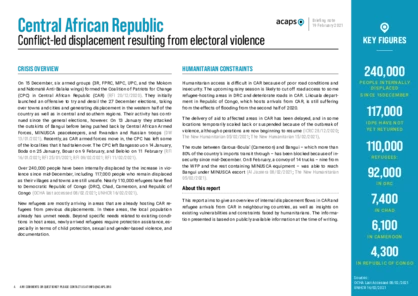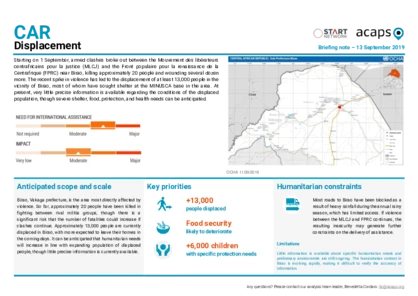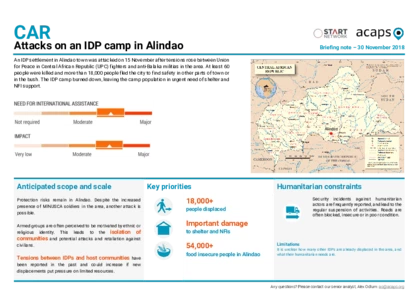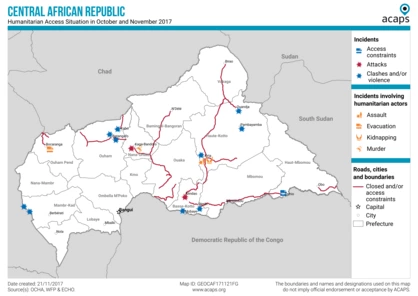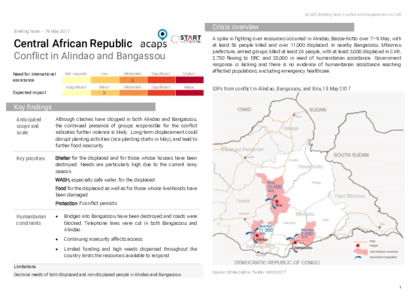Latest updates on country situation
07 January 2025
The number of people estimated to require humanitarian assistance has decreased from 2.8 million in 2024 to 2.4 million in 2025. Despite this 14% decrease, the population is still experiencing the impact of conflict and climate hazards. From September 2024 to March 2025, nearly two million people are expected to experience high levels of acute food insecurity (IPC Phase 3 or above), including 307,000 in Phase 4. Agricultural production remains low, compounded by the rising cost of essential goods and transportation. Sporadic clashes between armed groups and the Central African Armed Forces and their paramilitary auxiliaries are still being reported. By October 2024, 465,499 people were internally displaced in the Central African Republic. Of these, 73,000 were hosted in displacement sites, and around 392,000 were with host families, further straining limited resources. The conflict in Sudan and tensions in southern Chad are also causing the arrival of refugees, asylum seekers, and returnees to areas with limited humanitarian assistance. (OCHA 27/12/2024, OCHA 09/12/2024, IPC 27/11/2024)
09 July 2024
On 2 July 2024, members of the 3R (Retour, Réclamation et Réhabilitation) armed group attacked the village of Ngoutèrè, in Ouham Pende prefecture. Targeting the military detachment, they killed five members of the armed forces and eight civilians. The attack also displaced about 8,500 people, some to the city of Bozoum and others to the forest. Their needs remain unknown. (RFI 03/07/2024, RNL 04/07/2024)
23 April 2024
Following an attack by the Coalition des Patriotes pour le Changement on 14 April, two healthcare workers and a dozen civilians were killed, ten people injured, and at least six houses destroyed in Bakouma and Bangassou in Mbomou prefecture. Approximately 2,300 people were displaced from the neighbouring villages. These incidents have highlighted the need to enhance the protection of civilians and humanitarian workers. (OCHA 17/04/2024, RFI 17/04/2024)
22 August 2023
Since April 2023, armed clashes linked to intercommunal tensions in Logone Oriental and Mandoul regions in Chad have internally displaced around 26,000 people, while more than 37,000 have sought refuge in northwestern Central African Republic. More than 31,000 Chadian refugees and over 5,600 Central African returnees are with host families with limited resources, mostly in Lim-Pendé but also in Ouham prefecture. In Lim-Pendé prefecture, humanitarian needs had increased by 34% between 2022–2023 even before the arrival of the newly displaced people. Access to WASH and health services is becoming increasingly difficult given the significant increase in population in the host areas. Most urgent needs also include education, healthcare, and NFIs. The prices of certain food and non-food items have risen by up to 50% because of the disruption of commercial activities resulting from recurrent armed activity in the area bordering Chad. (OCHA accessed 22/08/2023, UN 12/06/2023, OCHA 19/06/2023)
25 July 2023
Since March 2023, armed group clashes in Haut-Mbomou prefecture have resulted in civilian deaths and the burning of houses, forcing civilians to flee. As at May, more than 7,500 people had fled to several localities in the same province, to Bangassou city (Mbomou prefecture), and to the Democratic Republic of Congo. The attacks often target civilians accused of supporting one side of the conflict. Displaced people are spread between displacement sites, host families, and the bush. Protection is the most urgent need of displaced people whose return is hampered by roadblocks in areas under the control of armed groups. Movement restrictions linked to the presence of armed groups on certain roads also limit the population’s access to their fields, their main source of subsistence. Access to basic services, such as health, has further decreased; in May, health facilities were looted in Mboki town, causing the evacuation of humanitarian staff. (OCHA accessed 25/07/2023, DW 23/03/2023, RNL 10/05/2023)
07 June 2023
Over 13,800 people, including around 3,400 Central African returnees, fled from Sudan to Am-Dafock (Vakaga prefecture) in the Central African Republic, following armed clashes in Darfur since April 2023. Displaced people, mostly women and children, currently live with host families and in makeshift camps. They are being relocated to Birao, a safer area further away from the border, where aid is being pre-positioned ahead of the rainy season. Needs include food, shelter, and healthcare. (OCHA accessed 09/06/2023, Africanews 07/06/2023)
30 April 2023
Around 9,700 people, including more than 3,400 Central African returnees, have fled Sudan to northeastern Central African Republic since clashes between the Sudanese Armed Forces and the Rapid Support Forces began in mid-April. The number of displaced people is likely to increase, as registration is still continuing. Most displaced people are in Am-Dafock village (Vakaga prefecture), living in makeshift shelters with the host community. The most urgent needs of the newly displaced include shelter, food, and WASH services.
The disruption of traffic between Sudan and the Central African Republic as a result of insecurity along the border area has caused an increase in the prices of certain basic products, particularly in the towns of Birao (Vakaga prefecture) and Ndélé (Bamingui-Bangoran). Sugar and millet prices have doubled in these areas, which rely heavily on Sudan for supplies.
A deterioration in humanitarian access is also expected during the rainy season (April–October), as Am-Dafock is a flood-prone area.
(OCHA 02/05/2023, RFI 30/04/2023, NYT 02/05/2023)
current crises
in
CAR
These crises have been identified through the INFORM Severity Index, a tool for measuring and comparing the severity of humanitarian crises globally.
CAF001 - Complex crisis
Last updated 29/04/2025
Drivers
Conflict/ Violence
International Displacement
Crisis level
Country
Severity level
4 High
Access constraints
4.0
Analysis products
on
CAR
19 February 2021
CAR: Displacement resulting from electoral violence
DOCUMENT / PDF / 290 KB
This report aims to give an overview of internal displacement flows in CAR and refugee arrivals from CAR in neighbouring countries, as well as insights on existing vulnerabilities and constraints faced by humanitarians. The information presented is based on publicly available information at the time of writing.
13 September 2019
CAR: Displacement
DOCUMENT / PDF / 310 KB
Starting on 1 September, armed clashes broke out near Birao, killing approximately 20 people and wounding several dozen more. The recent spike in violence has led to the displacement of at least 13,000 people in the vicinity of Birao, most of whom have sought shelter at the MINUSCA base in the area.
30 November 2018
CAR: Attacks on an IDP camp in Alindao
DOCUMENT / PDF / 970 KB
An IDP settlement in Alindao town was attacked on 15 November after tensions rose between Union for Peace in Central African Republic fighters and anti-Balaka militias in the area. At least 60 people were killed and more than 18,000 people fled the city to find safety in other parts of town or in the bush. The IDP camp burned down, leaving the camp population in urgent need of shelter and NFI support.
21 November 2017
CAR: Humanitarian access (map)
DOCUMENT / PDF / 3 MB
Access has been deteriorating throughout CAR in October and November 2017. In particular, access constraints due to violence and restrictions on movement have been reported in Batangafo (Ouham), Bangassou and Pombolo (Mbomou), Kaga-Bandoro (Nana-Grebizi), Zemio (Haut-Mbomou), and Nouffou (Mambere- Kadei). As of early November, over 200 attacks have targeted humanitarian workers, with 13 workers killed since January.
19 May 2017
CAR: Conflict in Alindao and Bangassou
DOCUMENT / PDF / 310 KB
A spike in fighting over resources occurred in Alindao, Basse-Kotto over 7–9 May, with at least 56 people killed and over 11,000 displaced. In nearby Bangassou, Mbomou prefecture, armed groups killed at least 26 people, with at least 3,000 displaced in CAR, 2,750 fleeing to DRC and 25,000 in need of humanitarian assistance.


